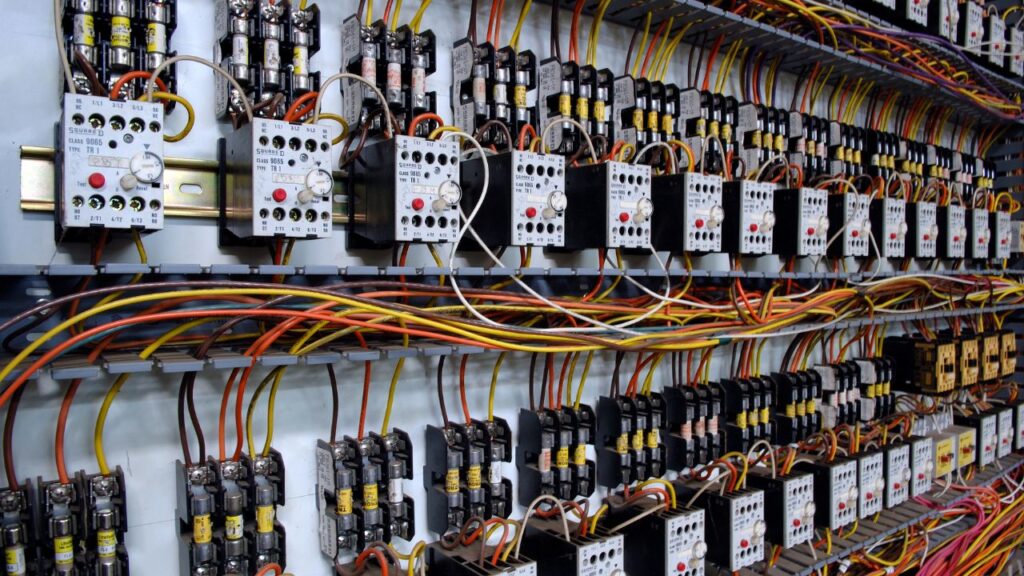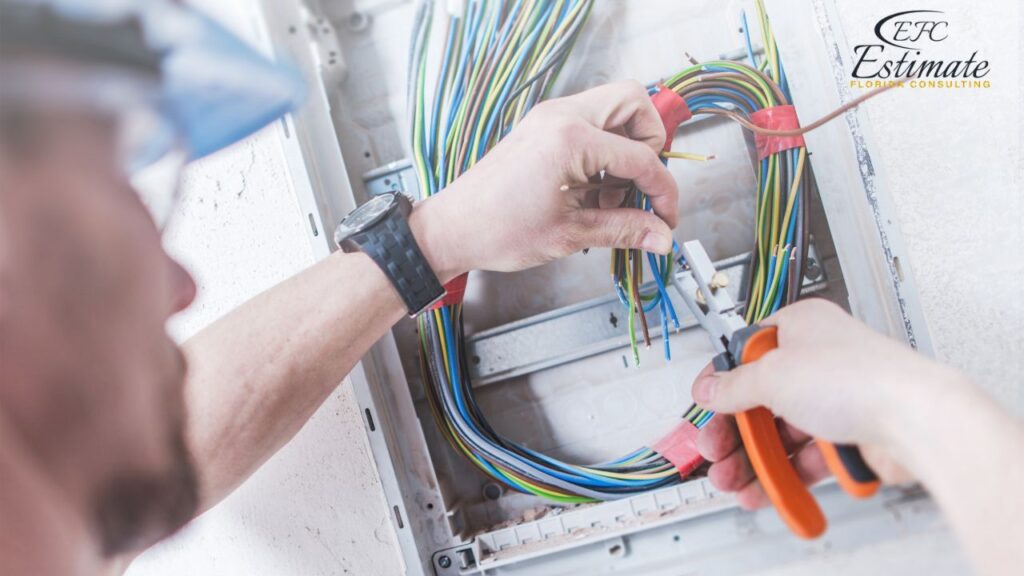Bid Confidently, Win Consistently – Zip Code Estimates Made Easy!
- Accurancy
- Efficiency
- Transparency
- Customization
- Time Saving
- Professionalism
- Cost Control

Are you noticing frequent circuit breaker trips, flickering lights, or a burning smell in your home? These signs may indicate a need for electrical rewiring. In this discussion, we’ll explore the importance of rewiring, identify signs that it’s needed, and break down the cost. Focusing on a 1,200 sq ft house, the cost of rewiring ranges from $6 to $20 per square foot. This means homeowners could spend between $7,200 and $24,000 or more on this essential project. We’ll also consider factors affecting these costs and offer tips for cost-effective rewiring.

Understanding these aspects is crucial for maintaining your home’s electrical safety and efficiency, while also making financially sound decisions for this important upgrade.

Fully Insured License
Hire Contractor For Electrical Rewiring

Make Informed Design Decisions Showcase Your Design Ideas
Get RenderingElectrical rewiring involves updating or replacing the electrical wiring system in a property, ensuring the safe and efficient flow of electricity through new wires.
This process is crucial for modernizing electrical systems, as outdated wiring can pose serious safety hazards such as electrical fires and shocks. By opting for a wiring upgrade, homeowners can not only ensure the smooth functioning of their electrical system but also increase the overall safety of their property.
Electrical rewiring plays a significant role in improving energy efficiency, reducing the consumption of electricity, and lowering utility bills. Professional electrical work and wiring installation are essential steps in this process to guarantee a reliable and long-lasting electrical system for the home.
Electrical rewiring is necessary to address safety concerns, prevent electrical hazards, and comply with modern electrical codes and standards.
Outdated wiring poses significant safety risks by increasing the chances of electrical fires and shocks. By undergoing electrical rewiring, homeowners can ensure the proper installation of protective measures, such as GFCIs and surge protectors, to enhance electrical safety at home. Meeting current electrical regulations through rewiring is essential to pass electrical inspections and ensure that the electrical system is up to date with the latest standards. Planning electrical upgrades during rewiring can also improve energy efficiency and reduce electricity costs in the long run.
The cost of electrical rewiring varies greatly based on your home’s size, typically determined by the number of bedrooms:
Number of Rooms | Size | Estimated Cost |
One Bedroom | up to 1,000 SF | $4,500 to $9,000 |
Two Bedroom | 1,000 to 1,300 SF | $5,900 to $14,000 |
Three Bedroom | 1,500 to 2,000 SF | $6,500 to $17,000 |
Four Bedroom | 2,000 to 2,500 SF | $8,000 to $22,500 |
Recognizing the signs that indicate a house needs rewiring can help homeowners address potential electrical hazards and safety risks proactively.
Flickering lights, burning smells, and the presence of outdated wiring are common indicators that signal the necessity for electrical rewiring. Ignoring these signs can lead to hazardous situations within the home, such as electrical fires or shocks. Timely intervention through professional electrical maintenance can ensure the safety of residents and prevent damage to valuable property.
Faulty electrical outlets are also red flags that shouldn’t be overlooked, as they can pose serious risks. Investing in electrical rewiring when these signs arise is not just about convenience; it’s a critical step in maintaining a safe and functional living environment.
Frequently tripping circuit breakers can be a clear indicator that the electrical wiring system requires attention and potential rewiring to prevent further disruptions.
This issue may arise due to a variety of factors such as overloading a circuit, a faulty appliance, or a short circuit. It is crucial to understand that circuit breakers are designed to trip as a safety mechanism when they detect an electrical fault.
If this becomes a regular occurrence, it could signal underlying wiring problems that need to be addressed promptly. Such issues can pose serious safety hazards and even lead to electrical fires if left unattended. In such cases, seeking advice from a qualified electrician is essential to ensure the safety of your electrical system.
Rewiring may involve obtaining an electrical permit, replacing outdated wiring, and upgrading the electrical panel to meet current safety standards. These electrical projects can significantly improve the reliability and safety of your home’s electrical system.”
The presence of a burning smell or sparks from outlets or switches signifies immediate electrical hazards that necessitate urgent rewiring to prevent potential fire risks.
Ignoring these warning signs could lead to serious consequences such as electrical fires or even electrocution. It is crucial to take proactive measures to address these issues promptly by contacting a licensed electrician to assess the situation and provide a thorough evaluation.

Ensuring that all electrical work is done with the appropriate permits in place is vital to guaranteeing compliance with safety standards. Taking the necessary steps to upgrade outdated electrical outlets and wiring can help prevent hazardous situations and provide peace of mind for homeowners.
Planning ahead and obtaining an electrical wiring cost estimate can assist in budgeting for these essential home upgrades.
Flickering lights in a property can indicate faulty wiring or electrical connections, prompting homeowners to consider electrical rewiring for improved lighting reliability.
The importance of a stable electrical service cannot be underestimated when it comes to ensuring a safe and well-lit environment within a home or commercial space. A properly functioning electrical system, including a well-maintained wiring diagram, is crucial for preventing potential hazards such as electrical fires or shocks.
Understanding the electrical cost breakdown associated with addressing flickering lights can help homeowners make informed decisions about investing in necessary repairs and upgrades to enhance overall electrical safety and efficiency.
Outdated wiring poses risks such as overloading circuits and increased fire hazards, making rewiring essential to modernize the electrical infrastructure and enhance safety.
Outdated wiring can lead to energy inefficiencies and result in higher electricity bills due to the strain it puts on the electrical system. By upgrading wiring systems through rewiring, homeowners can improve energy efficiency and reduce costs in the long run.
Compliance with current electrical standards is crucial for ensuring the safety and functionality of a property. Rewiring may require obtaining an electrical permit, but the upfront electrical wiring cost per square foot can be justified by the long-term benefits.
Understanding the electrical wiring cost breakdown can help homeowners make informed decisions when investing in rewiring projects to enhance the overall safety and value of their homes.
The cost of electrical rewiring is determined based on various factors such as the size of the house, type of wiring needed, labor expenses, and material costs.
The square footage of the property plays a significant role in influencing electrical wiring costs, as larger homes typically require more wiring and labor to complete the project. The type of wiring materials chosen, such as copper or aluminum wiring, can also impact the overall cost. Labor expenses are a key component of pricing estimates, as the complexity of the rewiring job and the experience of the electrician may influence the final cost. Keeping up with electrical wiring cost trends and utilizing an electrical wiring cost guide can help homeowners budget effectively for this essential home improvement project.
The size of the house directly impacts the cost of electrical rewiring, with larger properties requiring more wiring materials and labor, leading to higher overall expenses.
Larger homes, such as those with 3,000 square feet or more, can incur significantly higher electrical rewiring costs compared to smaller residences. The scalability of expenses is evident when considering that a larger house may require double the amount of wiring materials and significantly more hours of electrical labor.
For instance, a 1,500 square foot home may cost around $14,000+ for a full rewiring job, while a 3,500 square foot property could easily exceed $18,000+ due to the increased complexity and amount of wiring needed. This stark contrast highlights the substantial impact of square footage on electrical wiring cost comparison.
The specific type of wiring required for a rewiring project affects the overall costs, as different wiring materials come with varying price points and installation complexities.
Factors such as the choice between copper and aluminum wiring can significantly impact both the upfront expenses and long-term maintenance costs of a rewiring endeavor. While copper wiring is known for its superior conductivity and long-lasting durability, it typically comes at a higher initial cost compared to aluminum wiring.
On the other hand, aluminum wiring is more lightweight and cost-effective but may require special connectors to mitigate safety risks associated with its tendency to expand and contract. By considering these factors alongside utilization of an electrical wiring cost calculator, homeowners and contractors can make informed decisions regarding electrical wiring materials cost.

The accessibility of wiring areas within a property can influence rewiring costs, with challenging locations or concealed wiring requiring additional labor and time for installation.
These factors can significantly impact the overall electrical wiring cost breakdown of a project. To manage costs effectively, homeowners and contractors may need to implement strategic approaches when dealing with inaccessible areas during rewiring.
One useful strategy is to map out the electrical wiring layout in advance to identify potential obstacles or hard-to-reach spots. This proactive measure helps in minimizing unexpected challenges and streamlining the installation process. Utilizing specialized tools or equipment designed for intricate wiring tasks can improve efficiency and reduce the overall project duration.
Labor costs play a significant role in determining the total expense of electrical rewiring projects, reflecting the skill level of electricians and the time required for installation.
The expertise of the electrical contractor chosen for the project also influences labor costs, as highly skilled professionals may command higher rates due to their specialized knowledge and experience.
Factors such as the complexity of the residential wiring system and the need for any structural modifications can impact the overall labor expenses.

Efficient workforce management, overseen by an experienced electrical engineer, is crucial in optimizing labor costs by ensuring smooth coordination and timely completion of the rewiring process.
The average cost of electrical rewiring for a 1,200 sq ft house varies depending on the level of rewiring required, with basic, mid-range, and high-end options offering different pricing ranges.
Basic rewiring for a 1,200 sq ft house typically costs around $2310 to $4,620 or more, with an average electrical wiring cost per square foot ranging from $2 to $4.
Mid-range options may fall between $3,500 to $7,500, equating to approximately $4 to $6 per square foot.
For those opting for high-end rewiring, costs can go up to $10,000 or more, translating to $10 or above per square foot.
Factors influencing pricing include the complexity of the electrical system, the quality of materials used, labor costs, and any additional customization required, which can either increase or decrease the overall electrical wiring cost estimate.
Investing in quality materials and professional installation can lead to long-term electrical wiring cost savings by reducing the need for frequent repairs or replacements.
Basic rewiring for a 1,200 sq ft house typically ranges from $4,500 to $9,500, reflecting essential wiring upgrades and safety enhancements.
This cost range covers various aspects of electrical work involved in rewiring projects, such as replacing outdated wiring, installing new outlets, upgrading circuit breakers, and ensuring compliance with current electrical codes.
When considering the breakdown of electrical wiring costs, it’s important to note that labor charges, materials, permits, and any necessary inspections contribute to the overall estimate. Investing in these essential electrical improvements not only enhances the safety and functionality of your home but also adds value and peace of mind for homeowners.
Mid-range rewiring options for a 1,200 sq ft house typically fall within the $10,000 to $18,000 range, offering enhanced wiring quality and safety features.
Investing in mid-range rewiring projects not only ensures your home’s electrical system is up to code but also brings added benefits such as improved energy efficiency, reduced risk of electrical fires, and enhanced overall property value.
When considering the electrical wiring cost list for such projects, it’s important to account for materials, labor, and any potential upgrades needed to meet modern wiring standards.
By striking a balance between cost and quality, homeowners can enjoy a safe and reliable electrical system that meets their family’s needs for years to come.
High-end rewiring solutions for a 1,200 sq ft house typically range from $18,500 to $35,000 or more, incorporating advanced wiring technologies and premium safety features.
The higher costs associated with these top-tier electrical upgrades are justified by the long-term benefits they provide. By opting for advanced wiring solutions, homeowners can significantly enhance the safety and efficiency of their electrical systems. The use of high-quality materials and cutting-edge technologies ensures better performance and reliability, reducing the risk of electrical malfunctions and potential hazards. The increased durability and longevity of these premium features contribute to lower maintenance costs over time, making them a cost-effective investment in the overall lifespan of the home’s electrical infrastructure.
Several factors can influence the cost of electrical rewiring, including the age of the house, wiring material types, and project complexity.
The age of the house plays a crucial role in determining the condition of the existing wiring system. Older homes often have outdated wiring that may not meet current safety standards, necessitating a complete rewiring.
The choice of wiring materials can significantly impact costs, with options ranging from traditional copper wiring to newer, more expensive materials like aluminum.

The intricacy of the project, such as the size of the property and the number of electrical outlets needed, also contributes to the overall electrical wiring cost breakdown.
Keeping up with electrical wiring cost trends and exploring cost-saving measures can help homeowners manage the expenses associated with rewiring projects effectively.
The age of the house can significantly impact rewiring costs, as older properties may have outdated wiring systems that require extensive upgrades to meet modern safety standards.
Outdated wiring systems in older homes can pose serious electrical hazards, such as faulty connections, overheating, and potential fire risks. These issues are exacerbated in aging electrical systems due to wear and tear over time. Ensuring electrical safety in older properties becomes paramount to prevent dangerous situations.
Comprehensive rewiring not only enhances the overall safety of the house but also improves energy efficiency and reduces the risk of electrical fires. Investing in electrical upgrades for older properties is crucial to bring them up to code and protect both the residents and the property itself.
The choice of wiring materials influences rewiring costs, with premium options like copper wiring typically leading to higher expenses compared to standard alternatives.
This is because materials account for a significant portion of the electrical wiring cost breakdown. While copper is known for its durability and high conductivity, it comes at a premium price. On the other hand, aluminum wiring is a more cost-effective alternative but may require more maintenance over time.
When considering safety, copper is often preferred due to its lower risk of overheating and fire hazards. Advancements in aluminum alloy wiring have made it a safer option. These factors all play a role in determining the electrical wiring labor cost and overall project budget.
Understanding these cost implications can help in making informed decisions for your wiring projects and staying updated on current electrical wiring cost trends.
The complexity of an electrical rewiring project, such as the number of circuits, wiring routes, and existing conditions, can impact overall costs and project timelines.
When the intricacy of a project increases, so do the associated rewiring expenses. Complex projects often involve intricate electrical services and demand meticulous planning to accommodate various factors. Challenges arise when multiple wiring routes need to be rewired, existing conditions require extensive upgrades, or when specialized electrical maintenance is necessary.
Factors contributing to project complexity can include the size of the space being rewired, the age of the building, the need for custom wiring solutions, and compliance with specific electrical codes and regulations. Such complexities can significantly affect the overall scope and budget of an electrical project.
By leveraging the expertise of Estimate Florida Consulting, homeowners can navigate the complexities of electrical rewiring with greater confidence and efficiency. Their comprehensive services ensure not just cost savings, but also adherence to safety standards and long-term satisfaction with your electrical system.
From small to large projects, residential to commercial, we’re here to help you win. Fast results guaranteed.
Understanding the costs of electrical rewiring for a 1,200 sq ft house, average ranging from $4,500 to $35,000 or more, is vital for homeowners. Signs like frequent circuit breaker trips or flickering lights may indicate the need for rewiring, prompting action to address potential hazards. Investing in rewiring not only ensures safety but also improves energy efficiency and reduces long-term maintenance costs. Professionals like Estimate Florida Consulting can provide accurate cost estimates, budget planning assistance, and vendor recommendations, streamlining the process for homeowners and ensuring adherence to safety standards. With their support, homeowners can navigate rewiring projects confidently and ensure satisfaction with their electrical systems.
Electrical rewiring costs for a 1200 sq ft house typically range from $3,500 to $30,000, depending on the level of rewiring required and the materials used. Basic rewiring may cost around $3,500 to $8,000, mid-range options from $8,000 to $15,000, and high-end solutions from $15,000 to $30,000.
Electrical rewiring involves updating or replacing the electrical wiring system in a property to ensure safe and efficient electricity flow. This process is essential for modernizing electrical systems, enhancing safety, and complying with current electrical codes and standards.
Electrical rewiring is necessary to address safety concerns, prevent electrical hazards, and comply with modern electrical regulations. Outdated wiring can pose serious safety risks, such as electrical fires and shocks, making rewiring essential for maintaining a safe living environment.
Signs that a house needs rewiring include flickering lights, burning smells, frequently tripping circuit breakers, and outdated wiring. Ignoring these signs can lead to hazardous situations and increased risks of electrical fires or shocks.
The cost of electrical rewiring is determined based on factors such as the size of the house, type of wiring needed, labor expenses, and material costs. Larger houses, premium wiring materials, and complex projects can lead to higher overall rewiring costs.
Estimate Florida Consulting provides accurate cost estimation, budget planning assistance, vendor and contractor recommendations, project management support, and cost-benefit analysis for electrical rewiring projects. Their expertise ensures efficient navigation of rewiring complexities and adherence to safety standards.
Here I am going to share some steps to get your cost for Electrical Rewiring 1200 sq ft House estimate report.
You can send us your plan on info@estimatorflorida.com
Before starting your project, we send you a quote for your service. That quote will have detailed information about your project. Here you will get information about the size, difficulty, complexity and bid date when determining pricing.
Our team will takeoff and estimate your project. When we deliver you’ll receive a PDF and an Excel file of your estimate. We can also offer construction lead generation services for the jobs you’d like to pursue further.



561-530-2845
info@estimatorflorida.com
Address
5245 Wiles Rd Apt 3-102 St. Pete Beach, FL 33073 United States
561-530-2845
info@estimatorflorida.com
Address
5245 Wiles Rd Apt 3-102 St. Pete Beach, FL 33073 United States
All copyright © Reserved | Designed By V Marketing Media | Disclaimer